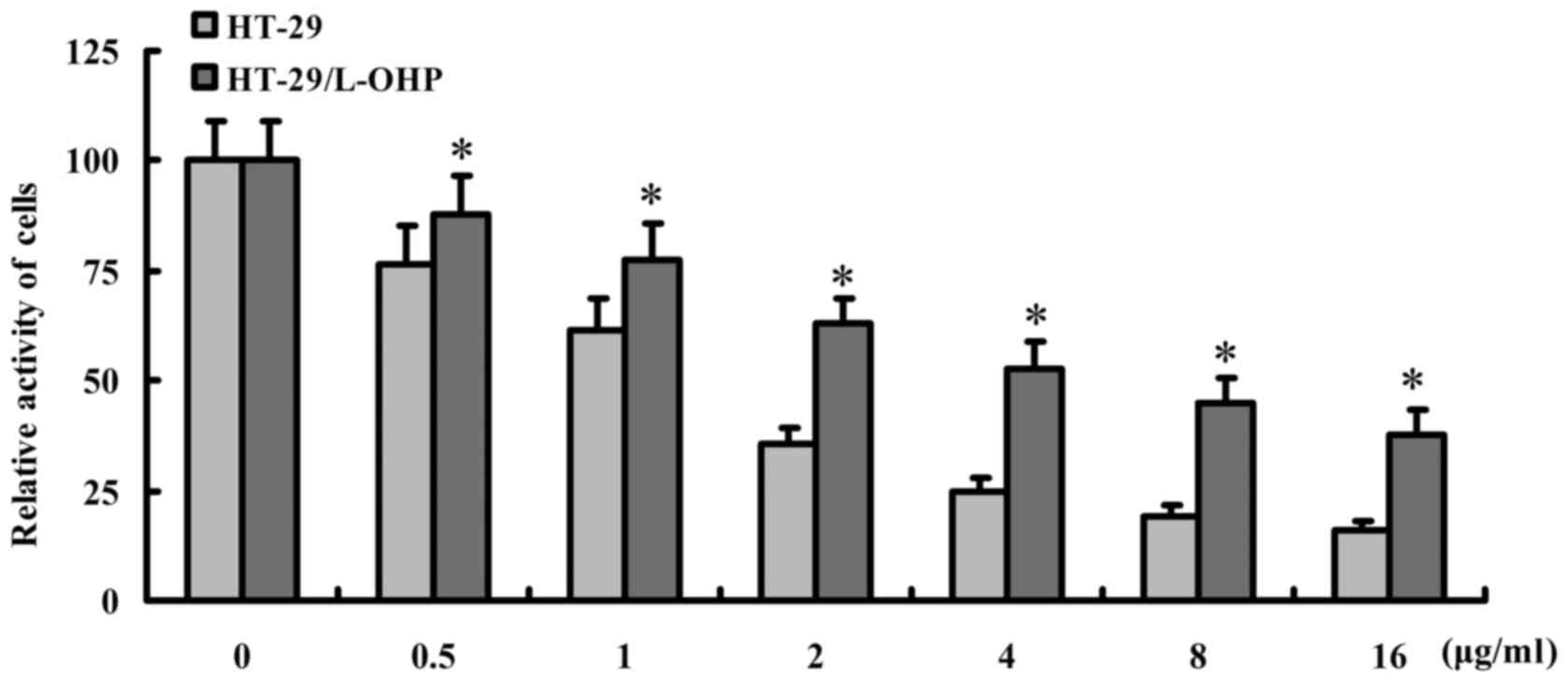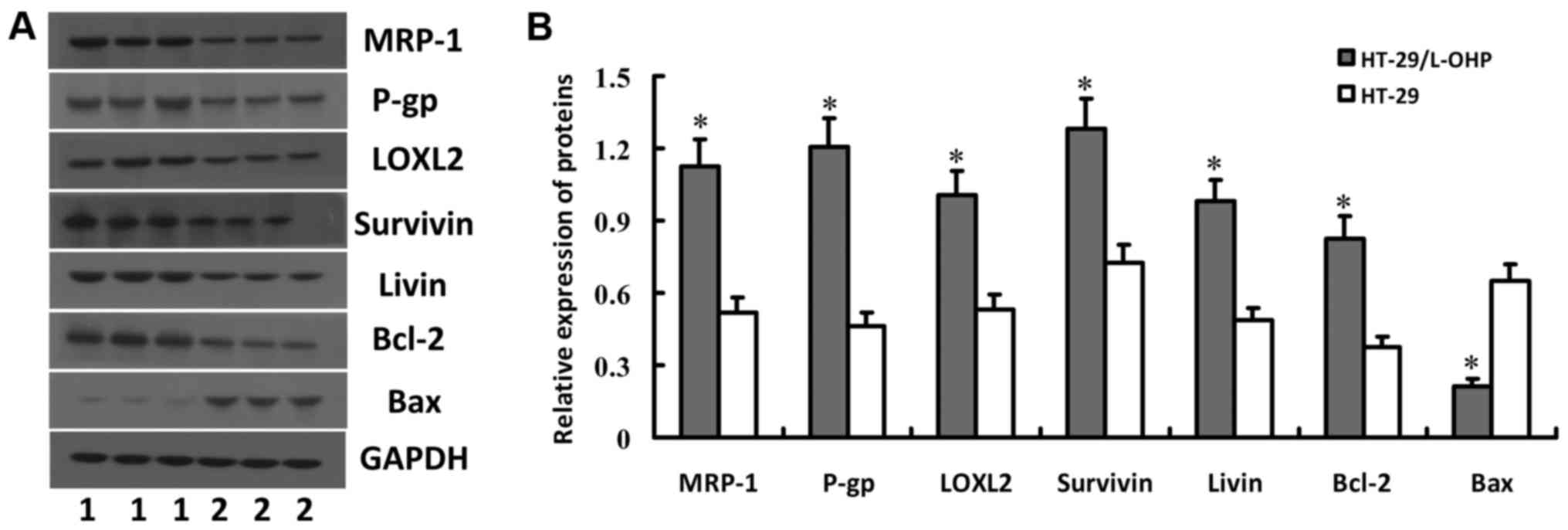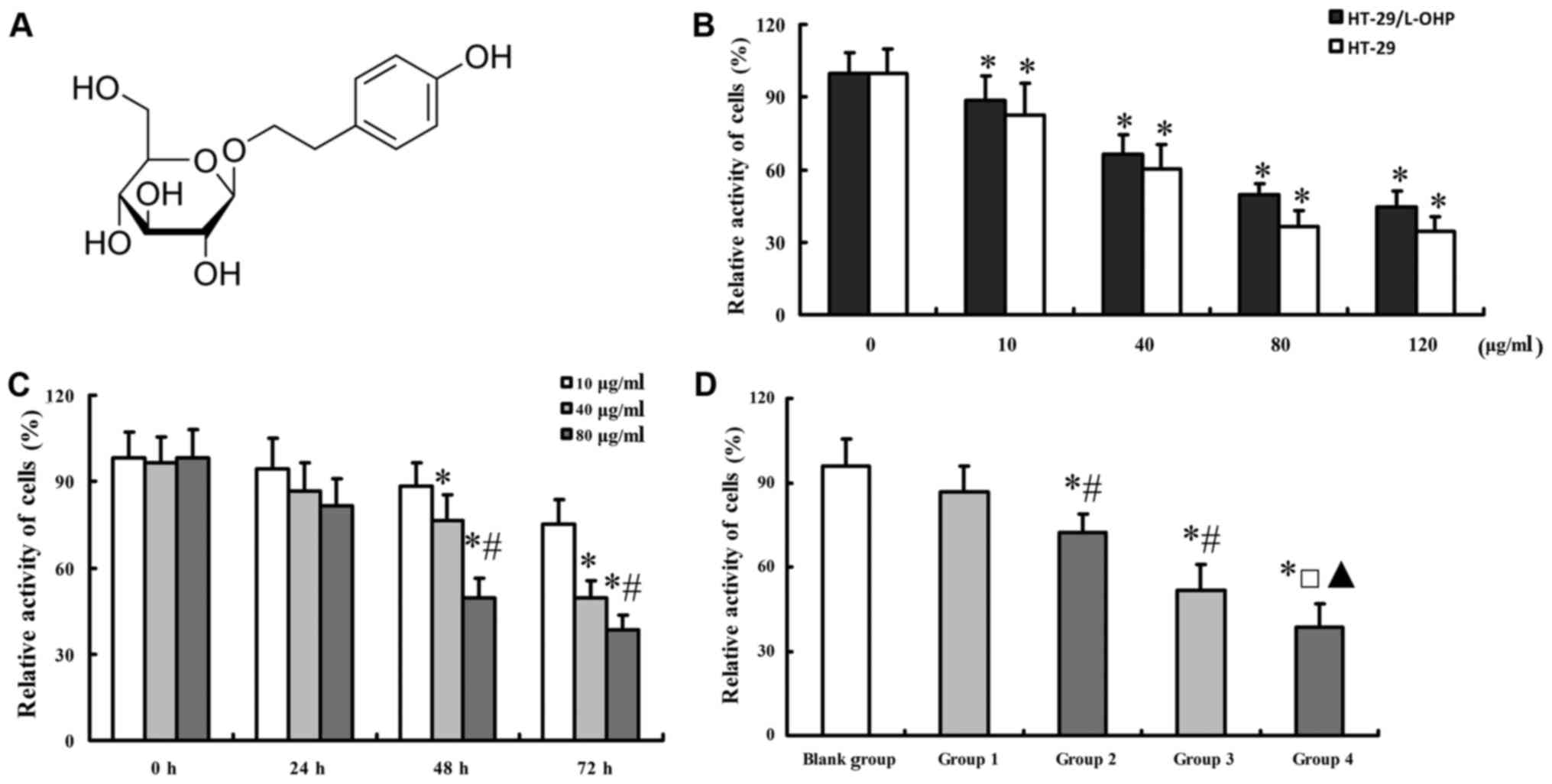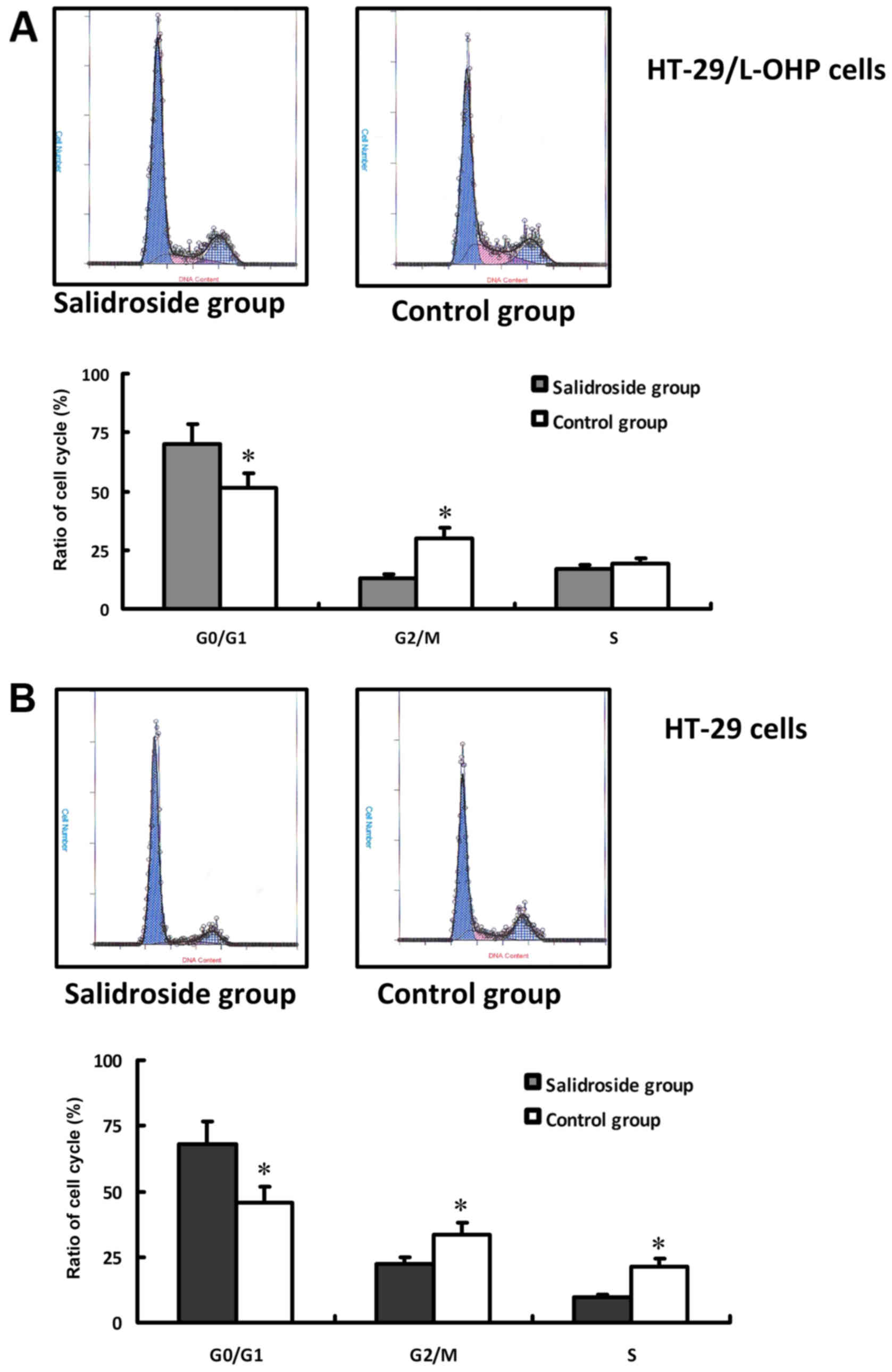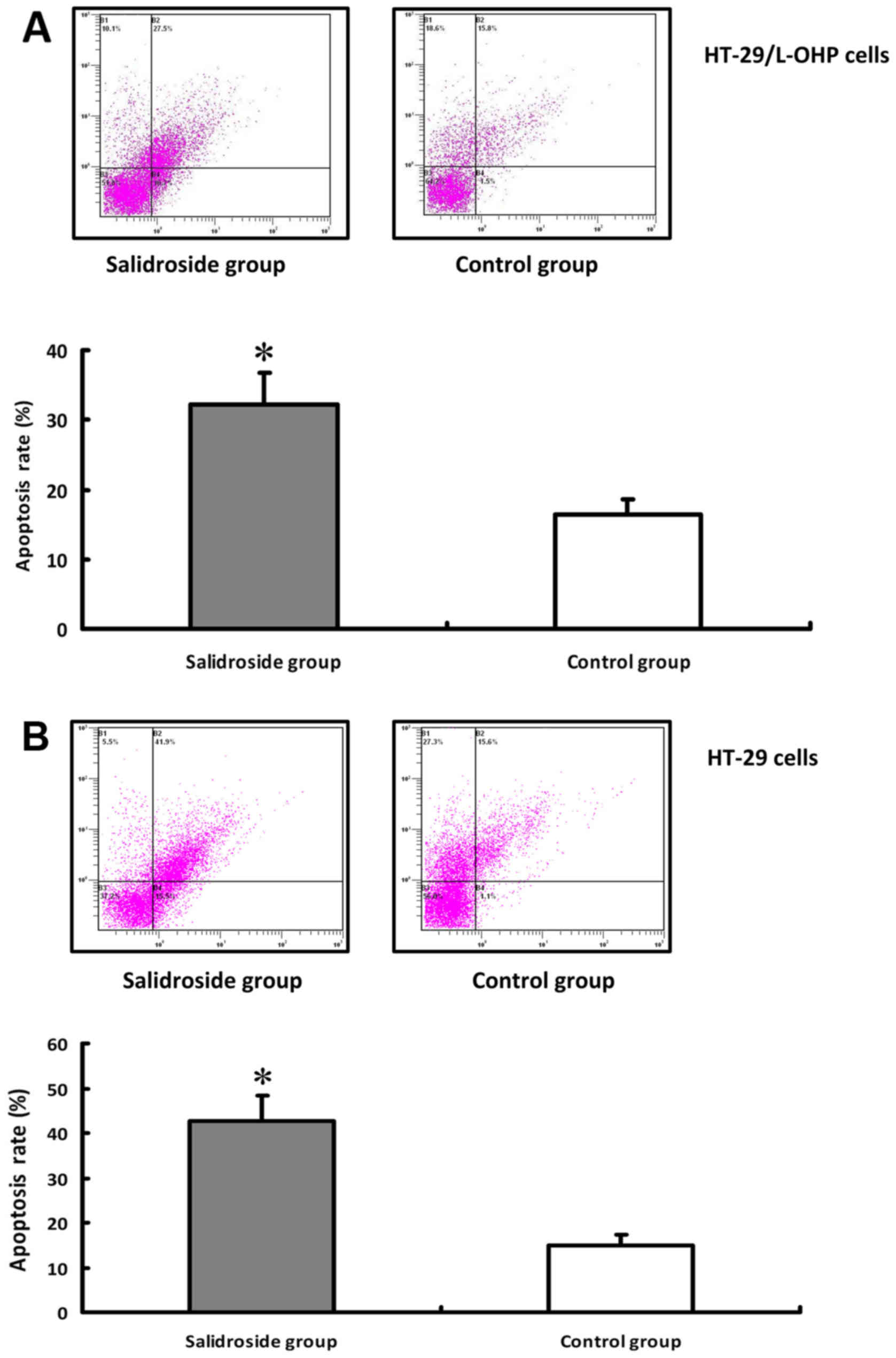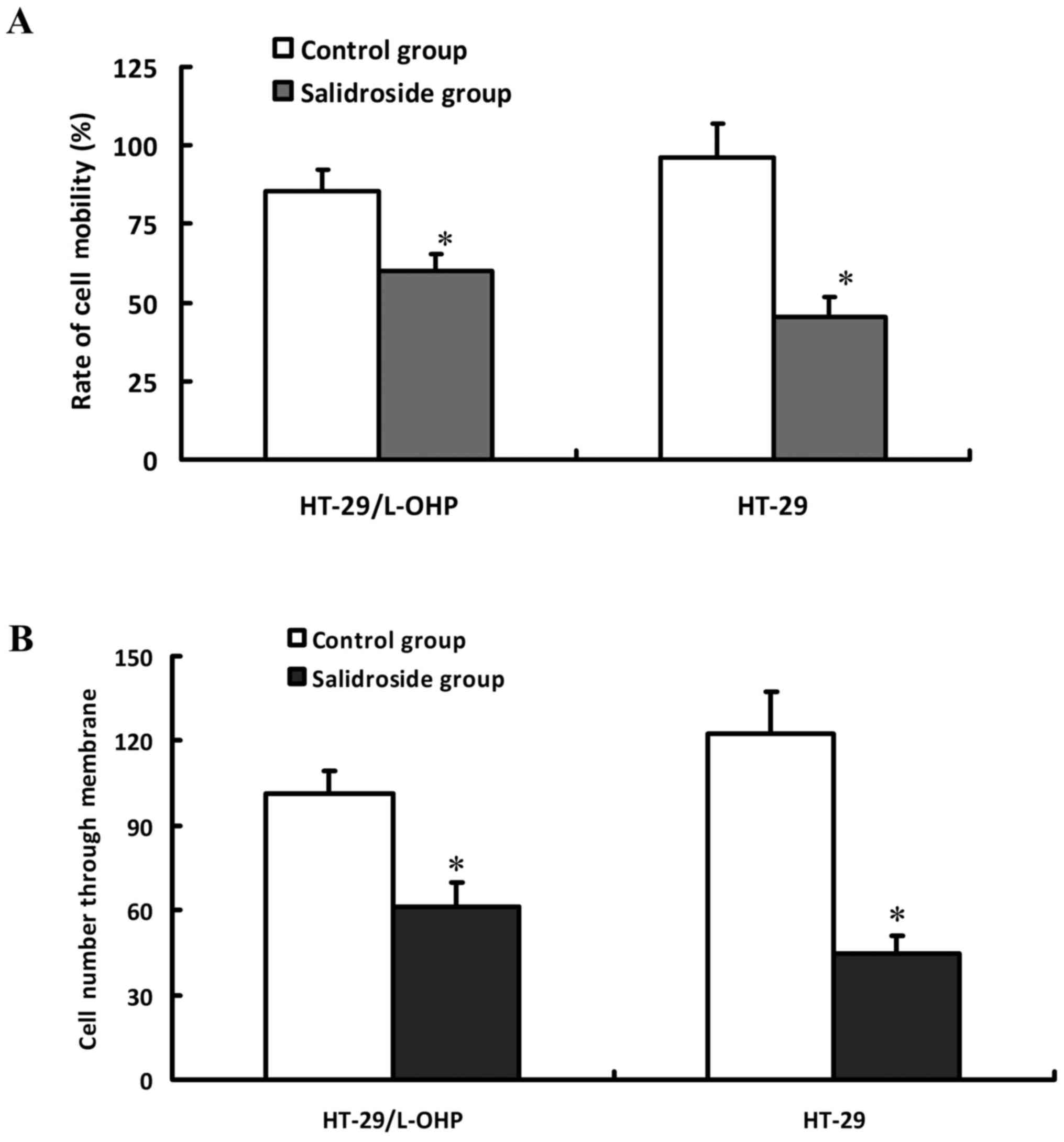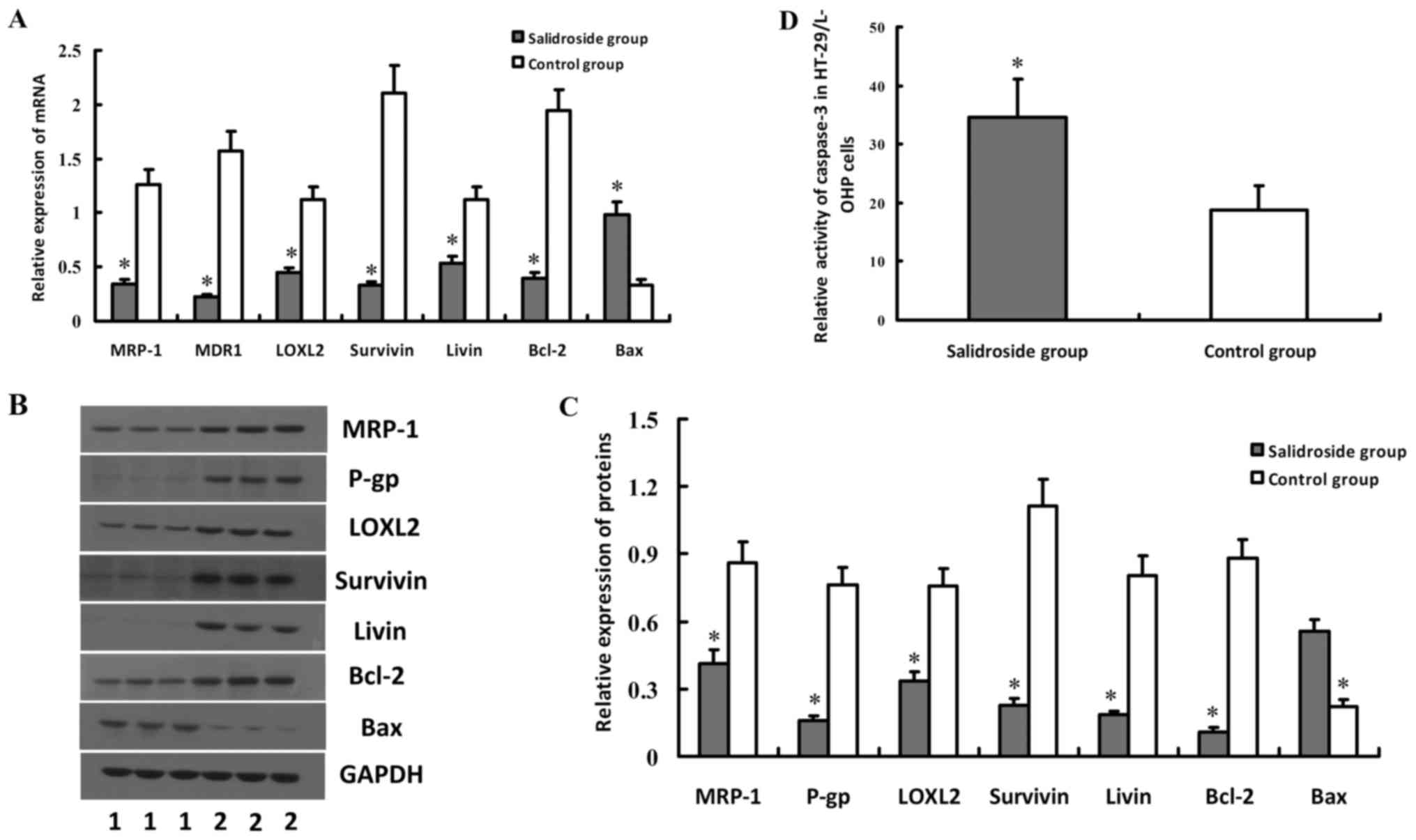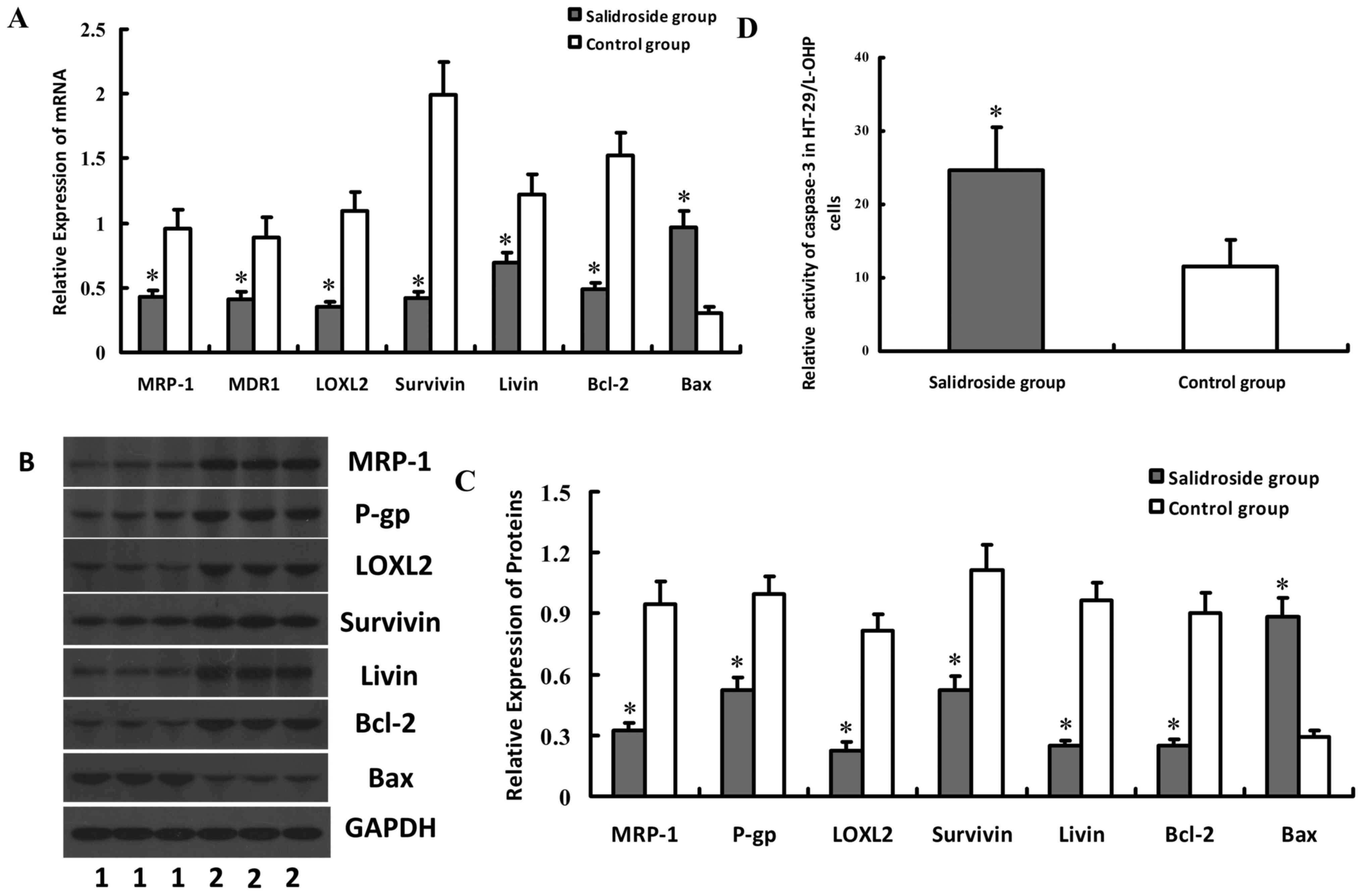|
1
|
Favoriti P, Carbone G, Greco M, Pirozzi F,
Pirozzi RE and Corcione F: Worldwide burden of colorectal cancer: A
review. Updates Surg. 68:7–11. 2016. View Article : Google Scholar : PubMed/NCBI
|
|
2
|
Chen W, Zheng R, Zeng H and Zhang S: The
incidence and mortality of major cancers in China, 2012. Chin J
Cancer. 35:732016. View Article : Google Scholar : PubMed/NCBI
|
|
3
|
Bode AM, Dong Z and Wang H: Cancer
prevention and control: Alarming challenges in China. Natl Sci Rev.
3:117–127. 2016. View Article : Google Scholar : PubMed/NCBI
|
|
4
|
Rogowski W and Sulżyc-Bielicka V: Optimal
duration of a first-line palliative chemotherapy in disseminated
colorectal cancer-a review of the literature from a developing
country perspective. Contemp Oncol (Pozn). 20:210–214.
2016.PubMed/NCBI
|
|
5
|
Zhao L, Liu R, Zhang Z, Li T, Li F, Liu H
and Li G: Oxaliplatin/fluorouracil-based adjuvant chemotherapy for
locally advanced rectal cancer after neoadjuvant chemoradiotherapy
and surgery: A systematic review and meta-analysis of randomized
controlled trials. Colorectal Dis. 18:763–772. 2016. View Article : Google Scholar : PubMed/NCBI
|
|
6
|
Betge J, Barat A, Murphy V, Hielscher T,
Van Grieken NC, Belle S, Zhan T, Härtel N, Kripp M, Bacon O, et al:
Outcome of colorectal cancer patients treated with combination
bevacizumab therapy: A pooled retrospective analysis of three
european cohorts from the angiopredict initiative. Digestion.
94:129–137. 2016. View Article : Google Scholar : PubMed/NCBI
|
|
7
|
Suzuki S, Shimazaki J, Morishita K, Koike
N, Harada N, Hayashi T and Suzuki M: Efficacy and safety of
oxaliplatin, bevacizumab and oral S-1 for advanced recurrent
colorectal cancer. Mol Clin Oncol. 5:391–394. 2016. View Article : Google Scholar : PubMed/NCBI
|
|
8
|
Zhang X, Chen Y, Hao L, Hou A, Chen X, Li
Y, Wang R, Luo P, Ruan Z, Ou J, et al: Macrophages induce
resistance to 5-fluorouracil chemotherapy in colorectal cancer
through the release of putrescine. Cancer Lett. 381:305–313. 2016.
View Article : Google Scholar : PubMed/NCBI
|
|
9
|
Garborg K: Colorectal cancer screening.
Surg Clin North Am. 95:979–989. 2015. View Article : Google Scholar : PubMed/NCBI
|
|
10
|
De Divitiis C, Nasti G, Montano M,
Fisichella R, Iaffaioli RV and Berretta M: Prognostic and
predictive response factors in colorectal cancer patients: Between
hope and reality. World J Gastroenterol. 20:15049–15059. 2014.
View Article : Google Scholar : PubMed/NCBI
|
|
11
|
Wang W, Liu J, Qi J, Zhang J, Zhu Q, Ma J
and Qin C: Downregulation of RLIP76 is associated with vincristine
resistance in human colorectal cancer HCT-8/VCR cells. Int J Oncol.
49:1505–1512. 2016.PubMed/NCBI
|
|
12
|
Oddo D, Sennott EM, Barault L, Valtorta E,
Arena S, Cassingena A, Filiciotto G, Marzolla G, Elez E, van Geel
RM, et al: Molecular landscape of acquired resistance to targeted
therapy combinations in BRAF-mutant colorectal cancer. Cancer Res.
76:4504–4515. 2016. View Article : Google Scholar : PubMed/NCBI
|
|
13
|
Wang Z, Zhang L, Ni Z, Sun J, Gao H, Cheng
Z, Xu J and Yin P: Resveratrol induces AMPK-dependent MDR1
inhibition in colorectal cancer HCT116/L-OHP cells by preventing
activation of NF-κB signaling and suppressing cAMP-responsive
element transcriptional activity. Tumour Biol. 36:9499–9510. 2015.
View Article : Google Scholar : PubMed/NCBI
|
|
14
|
Li F, Tang H, Xiao F, Gong J, Peng Y and
Meng X: Protective effect of salidroside from Rhodiolae radix on
diabetes-induced oxidative stress in mice. Molecules. 16:9912–9924.
2011. View Article : Google Scholar : PubMed/NCBI
|
|
15
|
Zheng KY, Guo AJ, Bi CW, Zhu KY, Chan GK,
Fu Q, Xu SL, Zhan JY, Lau DT, Dong TT, et al: The extract of
Rhodiolae Crenulatae Radix et Rhizoma induces the accumulation of
HIF-1α via blocking the degradation pathway in cultured kidney
fibroblasts. Planta Med. 77:894–899. 2011. View Article : Google Scholar : PubMed/NCBI
|
|
16
|
Li F, Xiao F, Gong J and Yu T: Applied
orthogonal experiment design for the optimum microwave-assisted
extraction conditions of polysaccharides from Rhodiolae radix. Afr
J Tradit Complement Altern Med. 10:179–185. 2013.PubMed/NCBI
|
|
17
|
Lv C, Huang Y, Liu ZX, Yu D and Bai ZM:
Salidroside reduces renal cell carcinoma proliferation by
inhibiting JAK2/STAT3 signaling. Cancer Biomark. 17:41–47. 2016.
View Article : Google Scholar : PubMed/NCBI
|
|
18
|
Wang J, Li JZ, Lu AX, Zhang KF and Li BJ:
Anticancer effect of salidroside on A549 lung cancer cells through
inhibition of oxidative stress and phospho-p38 expression. Oncol
Lett. 7:1159–1164. 2014.PubMed/NCBI
|
|
19
|
Zhao G, Shi A, Fan Z and Du Y: Salidroside
inhibits the growth of human breast cancer in vitro and in vivo.
Oncol Rep. 33:2553–2560. 2015. View Article : Google Scholar : PubMed/NCBI
|
|
20
|
Sun KX, Xia HW and Xia RL: Anticancer
effect of salidroside on colon cancer through inhibiting JAK2/STAT3
signaling pathway. Int J Clin Exp Pathol. 8:615–621.
2015.PubMed/NCBI
|
|
21
|
Kraus S, Nabiochtchikov I, Shapira S and
Arber N: Recent advances in personalized colorectal cancer
research. Cancer Lett. 347:15–21. 2014. View Article : Google Scholar : PubMed/NCBI
|
|
22
|
Berge E, Thompson C and Messersmith W:
Development of novel targeted agents in the treatment of metastatic
colorectal cancer. Clin Colorectal Cancer. 10:266–278. 2011.
View Article : Google Scholar : PubMed/NCBI
|
|
23
|
Temraz S, Mukherji D, Alameddine R and
Shamseddine A: Methods of overcoming treatment resistance in
colorectal cancer. Crit Rev Oncol Hematol. 89:217–230. 2014.
View Article : Google Scholar : PubMed/NCBI
|
|
24
|
Bian Z, Feng Y, Xue Y, Hu Y, Wang Q, Zhou
L, Liu Z, Zhang J, Yin Y, Gu B and Huang Z: Down-regulation of SNX1
predicts poor prognosis and contributes to drug resistance in
colorectal cancer. Tumour Biol. 37:6619–6625. 2016. View Article : Google Scholar : PubMed/NCBI
|
|
25
|
Suzuki S and Tanigawara Y: Forced
expression of S100A10 reduces sensitivity to oxaliplatin in
colorectal cancer cells. Proteome Sci. 12:262014. View Article : Google Scholar : PubMed/NCBI
|
|
26
|
Toki MI, Saif MW and Syrigos KN:
Hypersensitivity reactions associated with oxaliplatin and their
clinical management. Expert Opin Drug Saf. 13:1545–1554. 2014.
View Article : Google Scholar : PubMed/NCBI
|
|
27
|
Bi J, Bai Z, Ma X, Song J, Guo Y, Zhao J,
Yi X, Han S and Zhang Z: Txr1: An important factor in oxaliplatin
resistance in gastric cancer. Med Oncol. 31:8072014. View Article : Google Scholar : PubMed/NCBI
|
|
28
|
Chen CC, Chen LT, Tsou TC, Pan WY, Kuo CC,
Liu JF, Yeh SC, Tsai FY, Hsieh HP and Chang JY: Combined modalities
of resistance in an oxaliplatin-resistant human gastric cancer cell
line with enhanced sensitivity to 5-fluorouracil. Br J Cancer.
97:334–344. 2007. View Article : Google Scholar : PubMed/NCBI
|
|
29
|
Hu CJ, Wang B, Tang B, Chen BJ, Xiao YF,
Qin Y, Yong X, Luo G, Zhang JW, Zhang D, et al: The FOXM1-induced
resistance to oxaliplatin is partially mediated by its novel target
gene Mcl-1 in gastric cancer cells. Biochim Biophys Acta.
1849:290–299. 2015. View Article : Google Scholar : PubMed/NCBI
|
|
30
|
Bocharova OA, Serebriakova RV and Bodrova
NB: Preventive effect of Rhodiolae rosea in spontaneous
liver carcinogenesis in a mice model of high-tumor strain. Vestn
Ross Akad Med Nauk. 5:41–43. 1994.(In Russian).
|
|
31
|
Lee OH, Kwon YI, Apostolidis E, Shetty K
and Kim YC: Rhodiola-induced inhibition of adipogenesis involves
antioxidant enzyme response associated with pentose phosphate
pathway. Phytother Res. 25:106–115. 2011. View Article : Google Scholar : PubMed/NCBI
|
|
32
|
Bassa LM, Jacobs C, Gregory K, Henchey E,
Ser-Dolansky J and Schneider SS: Rhodiola crenulata induces
an early estrogenic response and reduces proliferation and
tumorsphere formation over time in MCF7 breast cancer cells.
Phytomedicine. 23:87–94. 2016. View Article : Google Scholar : PubMed/NCBI
|
|
33
|
Yu L, Qin Y, Wang Q, Zhang L, Liu Y, Wang
T, Huang L, Wu L and Xiong H: The efficacy and safety of Chinese
herbal medicine, Rhodiola formulation in treating ischemic heart
disease: A systematic review and meta-analysis of randomized
controlled trials. Complement Ther Med. 22:814–825. 2014.
View Article : Google Scholar : PubMed/NCBI
|
|
34
|
Wang J, Rong X, Li W, Yang Y, Yamahara J
and Li Y: Rhodiola crenulata root ameliorates derangements
of glucose and lipid metabolism in a rat model of the metabolic
syndrome and type 2 diabetes. J Ethnopharmacol. 142:782–788. 2012.
View Article : Google Scholar : PubMed/NCBI
|
|
35
|
Xiao L, Li H, Zhang J, Yang F, Huang A,
Deng J, Liang M, Ma F, Hu M and Huang Z: Salidroside protects
Caenorhabditis elegans neurons from polyglutamine-mediated
toxicity by reducing oxidative stress. Molecules. 19:7757–7769.
2014. View Article : Google Scholar : PubMed/NCBI
|
|
36
|
Helmbach H, Kern MA, Rossmann E, Renz K,
Kissel C, Gschwendt B and Schadendorf D: Drug resistance towards
etoposide and cisplatin in human melanoma cells is associated with
drug-dependent apoptosis deficiency. J Invest Dermatol.
118:923–932. 2002. View Article : Google Scholar : PubMed/NCBI
|
|
37
|
Hunakova L, Gronesova P, Horvathova E,
Chalupa I, Cholujova D, Duraj J and Sedlak J: Modulation of
cisplatin sensitivity in human ovarian carcinoma A2780 and SKOV3
cell lines by sulforaphane. Toxicol Lett. 230:479–486. 2014.
View Article : Google Scholar : PubMed/NCBI
|
|
38
|
Murphy RF, Komlodi-Pasztor E, Robey R,
Balis FM, Farrell NP and Fojo T: Retained platinum uptake and
indifference to p53 status make novel transplatinum agents active
in platinum-resistant cells compared to cisplatin and oxaliplatin.
Cell Cycle. 11:963–973. 2012. View Article : Google Scholar : PubMed/NCBI
|
|
39
|
Gourdier I, Del Rio M, Crabbé L, Candeil
L, Copois V, Ychou M, Auffray C, Martineau P, Mechti N, Pommier Y
and Pau B: Drug specific resistance to oxaliplatin is associated
with apoptosis defect in a cellular model of colon carcinoma. FEBS
Lett. 529:232–236. 2002. View Article : Google Scholar : PubMed/NCBI
|
|
40
|
Sui H, Fan ZZ and Li Q: Signal
transduction pathways and transcriptional mechanisms of
ABCB1/Pgp-mediated multiple drug resistance in human cancer cells.
J Int Med Res. 40:426–435. 2012. View Article : Google Scholar : PubMed/NCBI
|
|
41
|
Wang Y, Liu L, Liu X, Zhang H, Liu J, Feng
B, Shang Y, Zhou L, Wu K, Nie Y, et al: Shugoshin1 enhances
multidrug resistance of gastric cancer cells by regulating MRP1,
Bcl-2 and Bax genes. Tumour Biol. 34:2205–2214. 2013. View Article : Google Scholar : PubMed/NCBI
|
|
42
|
Le Calvé B, Griveau A, Vindrieux D,
Maréchal R, Wiel C, Svrcek M, Gout J, Azzi L, Payen L, Cros J, et
al: Lysyl oxidase family activity promotes resistance of pancreatic
ductal adenocarcinoma to chemotherapy by limiting the intratumoral
anticancer drug distribution. Oncotarget. 7:32100–32112. 2016.
View Article : Google Scholar : PubMed/NCBI
|
|
43
|
Véquaud E, Desplanques G, Jézéquel P, Juin
P and Barillé-Nion S: Survivin contributes to DNA repair by
homologous recombination in breast cancer cells. Breast Cancer Res
Treat. 155:53–63. 2016. View Article : Google Scholar : PubMed/NCBI
|
|
44
|
Hsieh CH, Lin YJ, Wu CP, Lee HT, Shyu WC
and Wang CC: Livin contributes to tumor hypoxia-induced resistance
to cytotoxic therapies in glioblastoma multiforme. Clin Cancer Res.
21:460–470. 2015. View Article : Google Scholar : PubMed/NCBI
|
|
45
|
Eimani Golestani B, Sanati MH, Houshmand
M, Ataei M, Akbarian F and Shakhssalim N: Expression and prognostic
significance of bcl-2 and bax in the progression and clinical
outcome of transitional bladder cell carcinoma. Cell J. 15:356–363.
2014.PubMed/NCBI
|
|
46
|
Wu S, Liu B, Zhang Q, Liu J, Zhou W, Wang
C, Li M, Bao S and Zhu R: Dihydromyricetin reduced Bcl-2 expression
via p53 in Human Hepatoma HepG2 Cells. PLoS One. 8:e768862013.
View Article : Google Scholar : PubMed/NCBI
|















